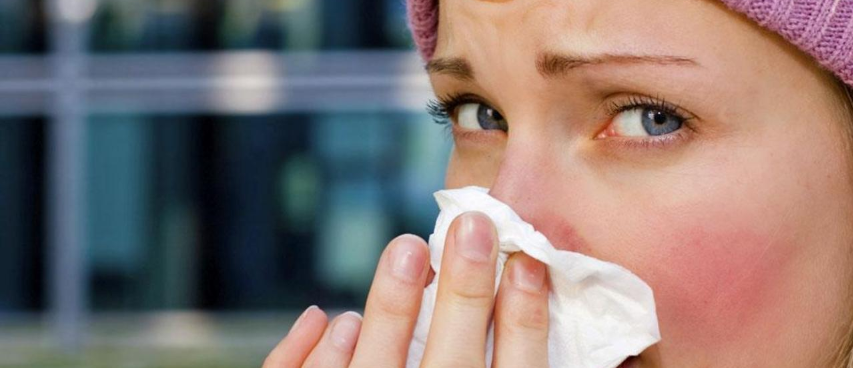The common cold – such an innocent-sounding ailment – is to blame for around 40% of all time off from work, and about 30% of school absenteeism. And it certainly is quite common; adults can expect to get between 4 to 6 colds per year, and children about 6 to 8. Despite the pervasiveness of this disease, there is little consensus on how to define, diagnose and treat it. [1] In this post I’d like to talk about what exactly is the Common Cold, discuss some common misconceptions and then look at what we can do about it from a Naturopathic perspective.

What is a Cold?
I notice that there is a lot of uncertainty about what is the difference between a cold and the flu. Quite simply, the flu is an infection by an influenza virus (from where the common name “flu” comes from). The “common cold”, on the other hand, is also a viral infection, but it could be one of hundreds of different viruses which cause the infection (rhinoviruses being the most common). It is generally understood that a cold occurs when the body is run down and the immune system is weakened to the extent that viruses which normally are no threat are able to overcome the body’s normal defence systems and cause an infection.
Common Misconceptions
1 – Inflammation is the enemy
When we are sick with a cold and flu, the symptoms are as a result of the inflammatory processes in the body. Something I consistently see in the medical community is a reflex of suppressing these inflammatory processes. A patient arrives at their family doctor with a cough, and the doctor prescribes cough syrup. A patient has a sore throat, and the doctor prescribes a throat spray. What these “treatments” accomplish is to suppress healthy systems in the body. For example, throat sprays often constrict blood vessels in the throat so that the immune cells cannot get into the infected tissue which then traps the killed microbes in mucus to be taken out of the body through coughing. So you use these “cold and flu treatments” and feel better because the inflammatory processes are suppressed. However, it is those same inflammatory processes which are trying to get rid of the bad microbes trying to overtake your body. Suppressing inflammation just serves to temporarily make you feel better whilst at the same time prolonging the illness in many cases. It does not address the underlying causes: weak immune system and microbial infection. We need to understand that these symptoms are our friends, not our enemies! [4]
2 – Vitamin C to the rescue!
When people (including many Medical Doctors) think of treating the common cold, the first thing that comes to mind is Vitamin C, and lots of it. This is, in part, due to the Nobel Laureate, Linus Pauling, publishing a book in 1970 where he argued that megadoses of vitamin C should be used for treating colds. Despite a lot of research to the contrary, this idea is still in the public consciousness. Although regularly taking Vitamin C has been shown to reduce the severity of colds, it’s therapeutic use at the time of illness has been scientifically shown to be of no value [5].

3 – Good Ol’ Antibiotics
Unfortunately, a disturbing number of people (including many Medical Doctors) turn to antibiotics at the first hint of infection. However, it is a well-established fact [2] that antibiotics are of no use for treating the common cold. Unfortunately, this common practice is highly dangerous, with risks for both the individual patient (such as Dysbiosis) as well as for society at large [3].
What can be done?
Thankfully there are a number of things that can be done if we use a bit of logical reasoning and solid scientific research.
1 – Rest and Hydration
The first goal should be to help out your immune system to do its job. For this, you should rest as much as possible once the symptoms of a cold have started. Most colds will go away on their own within a few days (some symptoms may last around 3 weeks), so have patience with yourself and remember that the more you rest, the better your body can fight the infection.
You should also try and keep your throat hydrated. Note that it is not about consuming liquid, but rather about keeping your throat moist. You are essentially trying to flush away microbes from the infected areas. So for this, you can regularly sip water or herbal teas. There are some useful things to add to your drinks, such as lemon and honey. Lemon is an amazing natural disinfectant, and honey is a very versatile natural anti-microbial.
2 – Zinc
It has been discovered that Zinc lozenges have been very useful in fighting throat infections involved in the common cold [6]. It is important to use the lozenges, and not syrup or tablets, as interaction with saliva is essential for activating the zinc to exert a direct antiviral activity. The recommended lozenges to use are those containing zinc acetate or gluconate and try and avoid those containing citric acid, sorbitol or mannitol. You can take one lozenge up to every 2 hours whilst the symptoms persist.

3 – Botanical Medicine
Two herbal remedies which have proven to be of great benefit are Echinacea and South African Geranium. Echinacea is better early on in the infection, and I personally prefer to take it as a tincture with 20 drops in a small amount of water every two hours. It exerts direct local effects and is useful in all upper respiratory infections.With South African Geranium (also referred to as pelargonium), you can also take this as a tincture and has been shown to significantly reduce both the symptoms, as well as the duration of common colds [7].
References
[1] PubMed: Common Cold
[2] Center for Disease Control. “Antibiotic use for the Common Cold”
[3] Llor & Bjerrum (2014). “Antimicrobial resistance”
[4] Ptizzoccaro (2016). “The Symptom as Ally, not Enemy”
[5] Hemila & Chalker (2013). “Vitamin C for preventing and treating the Common Cold”
[6] Singh M, Das RR. “Zinc for the common cold“.
[7] Lizogub, Riley & Heger (2007). “Efficacy of a pelargonium sidoides preparation in patients with the common cold: a randomized, double blind, placebo-controlled clinical trial.“

Outstanding post, I believe blog owners should learn a lot from this web site
its really user friendly. So much great info on here :D.